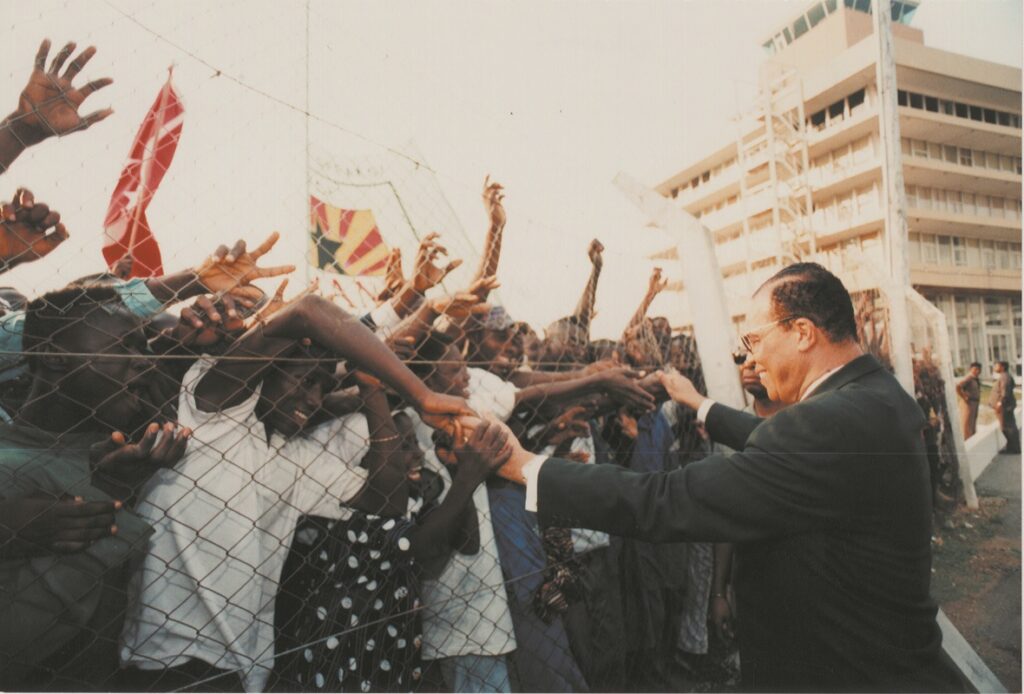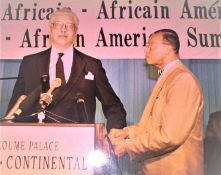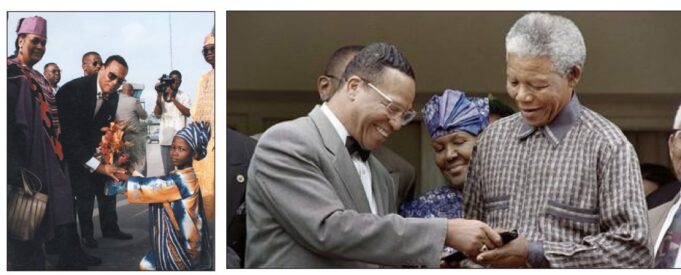Economist Redge Nkosi expressed appreciation and admiration to the Honorable Minister Louis Farrakhan for championing issues plaguing Africa. The Pretoria-based founder and executive director of First Source Money and Public Banking of South Africa spoke about the Muslim leader’s impact on the continent.

“Minister (Louis) Farrakhan like many other African leaders including Malcolm X, and Dr. Martin Luther King have advocated (for) the freedoms that Africans yearn for.” Nkosi, who is a former member of both Nelson Mandela and Thabo Mbeki administrations, added, “They’ve advocated the unchaining of Africa from predatory nations like the United States and European Union.”
Nkosi, who will attend the pre-BRICS summit in June and the BRICS summit in August in South Africa, said an example of Minister Farrakhan’s dedication to Africa was in the position he took encouraging Africans not to take the COVID vaccine.
The Minister’s position was “much appreciated on the continent,” Nkosi told Africa Watch from his office in Pretoria. Nkosi also said, not just regarding the vaccine, “but many of Minister Farrakhan’s political views are views held by many in Africa, and that’s why he continues to be admired.”

To have an “African person” echoing in the U.S. the sentiments of fellow Africans on the mother continent is highly appreciated,” Nkosi explained. “With great interest, Farrakhan’s views are of interest to Africans wherever in the diaspora Africans happen to be.”
One of the Minister’s great accomplishments regarding the continent, out of the many ones that could be chosen from, is his 1993 address in Gabon to African leaders and representatives representing 19 African countries.
This writer not only attended this bi-annual “African African-American Summit” but was personally contacted by the late Rev. Dr. Leon Sullivan of Philadelphia, the organizer of the summit, to discuss the possibility of the Minister’s attendance. After a spirited discussion, a letter of invitation was written, and the Minister accepted the invitation.
“Aimed at bridging gaps opened by hundreds of years on opposite sides of the Atlantic, the weeklong intercontinental gathering looked like a reunion of the leading figures of America’s civil rights era. The Rev. Leon Sullivan organized the conference, which drew Coretta Scott King, former UN ambassador Andrew Young, Jesse Jackson, the Rev. Joseph Lowrey and Dick Gregory,” The Washington Post reported about the historic gathering.
Conference officials said one of the meeting’s initial successes was bringing together in Africa “the many strands of America’s Black leadership, which at home often are quarreling because of conflicting egos, ambitions and platforms.”
According to the Washington Post, “Louis Farrakhan, minister of the Nation of Islam in the West … electrified a breakfast audience today with a call for Black unity. Praising his contemporaries here, and using references to Jesus Christ and the Old Testament, he called for humility among Black leaders. ‘Don’t put down one of us, because each of us has something to offer,’” he said.

The Washington Post’s telling of the story is incomplete. Attending the breakfast, this writer was awe-inspired by Minister Farrakhan’s ability to resolve an issue that if not corrected could have done serious damage.
The African heads of state and their entourages arrived a day before the Black American leaders. The American delegation also included businesspeople representing major corporations, religious leaders, and politicians, including Virginia Governor Douglas Wilder and artists including, Ruby Dee, her husband Ossie Davis, and actress Cecily Tyson.
The problem became that the African leaders’ and their delegations had taken all the hotel rooms in the host hotel. So that day Black American leaders and the American delegation had to fend for themselves for a place to stay. Rev. Sullivan got on Libreville media outlets asking Gabonese citizens to put up conference delegates for a night. That night, with several of my travel friends, we stayed at a family’s home.
The next morning at breakfast, sufficed to say, Rev. Sullivan had some explaining to do. For the explanation, Minister Farrakhan rose to the occasion. Using scripture, he spoke of the “baby Jesus” looking for a place to be born. He beautifully tied what occurred the night before to the substance of what the summit represented and to the leaders seated in front of him as the harbingers of Rev. Sullivan’s vision. That vision included uniting Africans in the diaspora with Africans on the continent.
During the summit, Minister Farrakhan addressed the entire gathering. His weighty remarks included a spiritual undertone. “If we are leading people and we are unaware of the time and what the time demands, then our leadership and those who follow our leadership will suffer loss. What time is it, dear leaders? It is time for us to lead our people in accord with the time,” the Minister stated.
“Time demands that those of us who have been enslaved be free; time demands that those of us who yesterday suffered under colonial rule must come out from under colonial power. Time demands that neo-colonialism must never be allowed to be substituted for an old form of colonialism which allows a Black face to administrate over the same old plantation system of our former colonial masters,” said Minister Farrakhan. Follow @JehronMuhammad on Twitter













